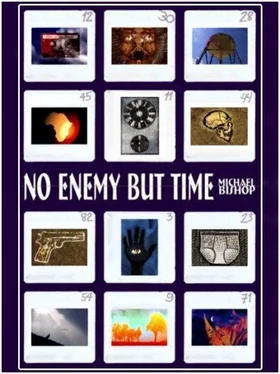“Johnny, please.”
“I like your title, though. It’s a helluva lot classier than your last one. It’s a rip-off, too, of course—but a subtle rip-off.”
Jeannette had called last year’s book for the Vireo Press I Couldn’t Put It Down, and I Was Sorry When It Ended . It had been a collection of whimsically philosophical essays about American reading habits since the advent of commercial television in the late 1940s. At least three different reviewers, working on three different urban newspapers in three different cities, had independently arrived at the same five-word notice for Jeannette’s book (“I could, and I wasn’t”), but it had sold nearly forty thousand copies in hardcover and ten times that in paperback. The success of this book, her second, had enabled Jeannette to pioneer a totally independent life without taking Anna out of college or putting John-John to work evenings as a busboy or carhop. She undoubtedly believed that a little gratitude was in order.
“Listen,” she began, calmly enough. “Listen, Johnny—”
“If you go ahead and publish this, Mamma, I’m going to… I can’t believe you’ve done this, I really really can’t—”
“Johnny, two-thirds of my advance money is spent. I’ve missed my deadline twice.”
“You said you were doing a book on Dust Bowl days in de heart ob de heart ob de country.”
“Stop it. I was. I am. But this took me over, John-John, it took precedence, I intended it as a—”
“Yeah, I know. A tribute.”
It was a “tribute” that marked a rupture in their relationship as vast and unbridgeable as the Great Rift Valley itself. Jeannette, he told himself, was not really his mother; she had never viewed him as anything other than a social experiment, as some people might gingerly indulge a proclivity for pedophilia or peach-flavored soda pop. For sixteen years he had been her personal experimental subject. It was past time to end his mother’s experiment and to discover who he was without her aid or intervention.
“Do whatever you want,” he told the woman at the drafting-board desk. “Publish it, don’t publish it.
You’re never going to see me again, anyway. Not ever, mujer .”
“You’re sixteen, Johnny. You’ve got another year of school. Do you think you’re ever going to—”
As if constrained by weight limits other than those dictated by his own size and strength, he packed light.
His mother—the woman named Jeannette Monegal—watched him, but he had nothing more to say to her and got out of the apartment as quickly as he could.
* * *
Dressed for the mid-morning chill of April, he caught a taxi across the George Washington Bridge into Jersey. This trip cost him dearly, so he hitchhiked into Paterson, riding high in the cab of a West Point Pepperel semi. The driver, a burly man with a soft southern accent, had a rattlesnake skin stretched across the dashboard. The skin resembled a dingy cellophane scabbard, and the hitchhiker put his hands between his legs to keep from accidentally touching the discarded sheath.
The driver grinned a great deal but talked only intermittently. In Paterson he agreed to carry the hitchhiker right down the turnpike into Dixie, if only his passenger would sing to keep him awake. The driver preferred songs that were either sprightly or obscene. Or both. “La Cucaracha” proved to be one of his particular favorites, and the hitchhiker sang it virtually without letup for the first sixty miles on the turnpike.
“That’s pretty,” the driver told him. “What’s your name?”
“Kampa,” said the hitchhiker. “Joshua Kampa.”
“Right,” the driver responded, wringing the steering wheel as if it were a dishrag. “Only a Mexican could sing ‘La Cucaracha’ the way you do….”
A Disappearance
Helenwas the one who finally made a clear sighting of the creatures that had been following us for the past two days, and she informed the rest of us by throwing back her head and emitting a single ear-splitting bark. To the east, not more than two hundred yards away, I saw three small figures looking at us from the lip of a wedge-shaped kopje. They scrambled out of view as soon as Helen’s cry reached them, but I no longer had any serious doubts about the identity of our pursuers.
A large band of gracile australopithecines— A. africanus —had been moving almost parallel to our own line of march, using the high patches of savannah grass and the oasis-like islands of thorn trees and acacias as blinds. Since my arrival in the Pleistocene I had seen only a few representatives of this supposedly well-distributed hominid species, always at a great distance. Although I had seen members of the allegedly rarer A. robustus at closer range, circumstantial evidence suggested that both species were rapidly dying out.
Alfie and the other Minids wasted no pity on the australopithecines. Now that they understood how close our tag-tails had drawn, they seemed to be considering the wisdom of a sally against them. A nervous alertness informed everyone’s behavior; the men kept exchanging glances and making noisy feints in the direction of the graciles, who, after skeedaddling to deeper cover, remained altogether out of sight for the next hour or so. As I had not wanted to shoot a chalicothere, neither did I wish to join a war party against our hobbity shadows to the east.
Helen came to me and peered into my eyes as if trying to communicate a profound or frustratingly complex notion. We had paused for a moment on the edge of an arroyo, and I stared down into the cracked stream bed trying to arrange my intuitions into a sensible pattern. What did Helen want to convey? I had no idea. She, as if to prompt me to comprehension, patted one lean, hairy breast and made a mewling sound. Again, shrugging my shoulders and opening my hands to demonstrate my bewilderment, I wished fervently that she could speak. Charades have never been my forte.
“Helen—Helen, I don’t know what you want.”
Helen retreated from me, leapt down into the stream bed, and began following it northward, back the way we had come.
“Helen, what are you doing?” I cried. “Where are you going?”
The other Minids seemed unperturbed. I jumped down into the gully and trotted after her, but she waved me back without ceasing to retreat from us. When she clambered up the eastern bank, plunged into a thicket some thirty or forty yards farther on, and completely disappeared from my vision, my heart sank. I was astonished and hurt. Later, with more facts at my disposal, her departure made sense, but at the moment it struck me as arbitrary, erratic, and maybe even suicidal. The last glimpse I had of her was a flash of vivid red from the bandanna about her neck, and that red seemed frighteningly portentous.
Reluctantly I followed the others.
Afternoon sloped into evening. What was going on? How had I offended Helen? By failing to understand her? By refusing to make bellicose gestures at the band of A. africanus shadowing us? Had Helen’s disillusionment with me sent her off across the savannah in search of another husband?
Pathetically egocentric, these questions pinched at my forebrain and hung on like angry crayfish. Reason would not shake them loose. I began to wonder if I could survive without Helen.
* * *
Toward twilight we approached a water hole on whose opposite bank stood a female black rhino and her hairy calf. They snorted at the water, nuzzling it with vaguely prehensile lips. The evidence of their hides—splotched, mud-caked, rubbery-looking—suggested that they had already enjoyed a good wallow and were now just fooling around, keeping other thirsty animals at bay by refusing to depart.
Читать дальше



![Ally Carter - [Gallagher Girls 01] I'd Tell You I Love You But Then I'd Have to Kill You](/books/262179/ally-carter-gallagher-girls-01-i-d-tell-you-i-lo-thumb.webp)








